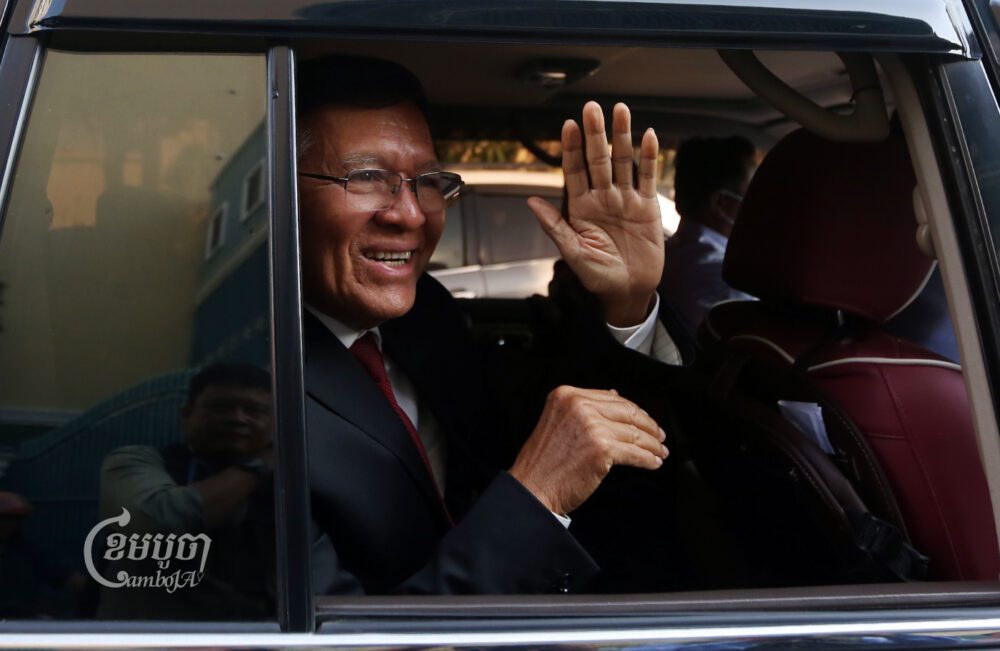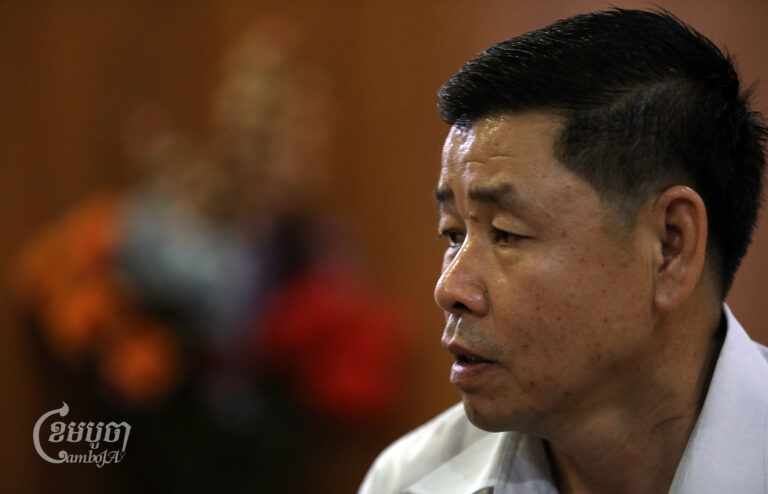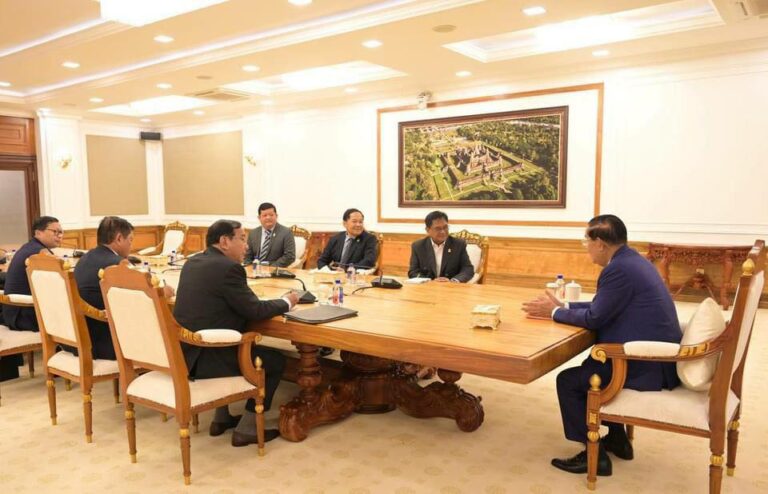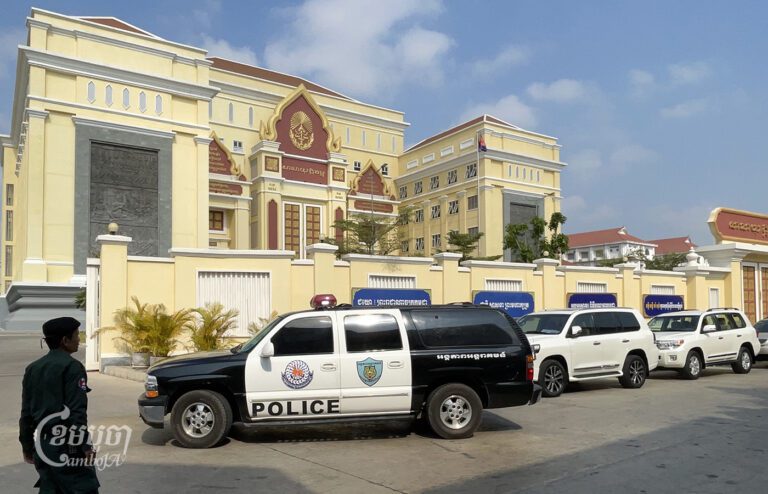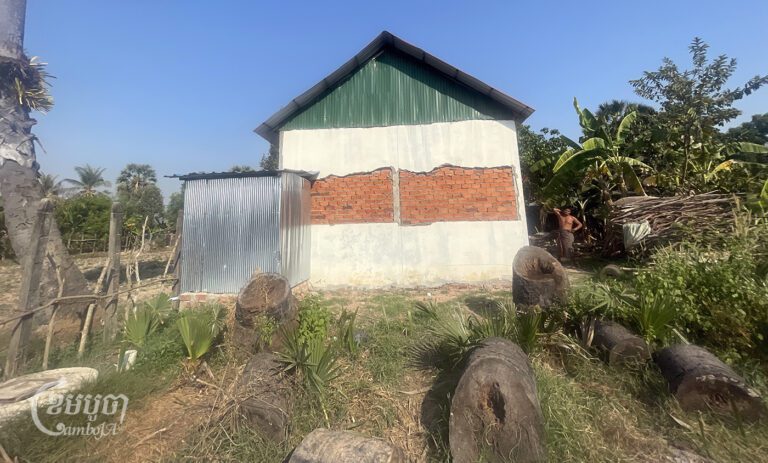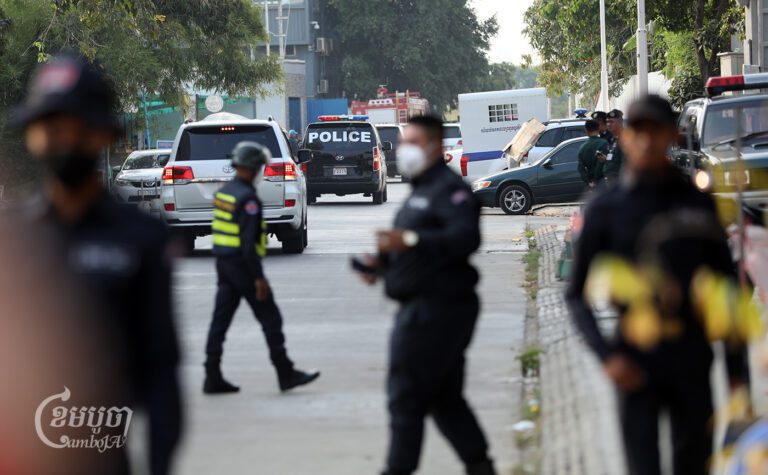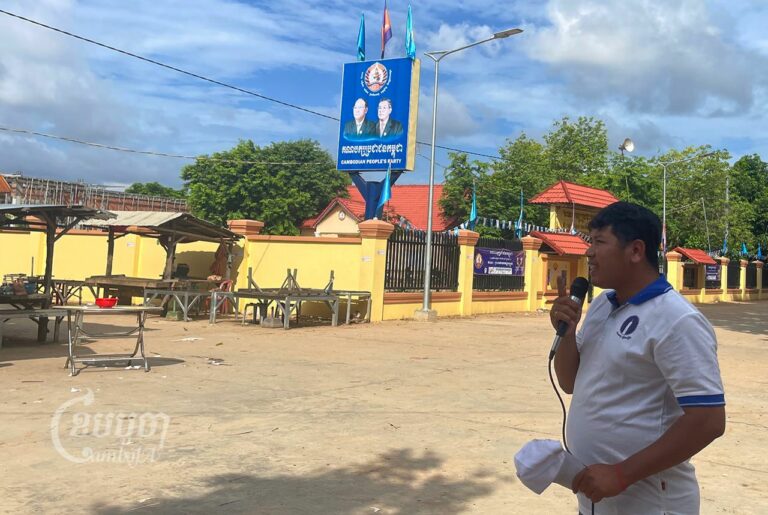Opposition leader Kem Sokha’s appeal hearing began on Tuesday, with the Court of Appeal rejecting his request to reduce the strict nature of his house arrest. He asked the court to grant him visitation rights so that he can meet people.
“He [Sokha] requested [the court] not to restrict his visitation rights,” his lawyer Ang Oudom told reporters after the trial.
The visitation restriction not only affected Sokha but also his family members and people who are working with him, such as his lawyers, who need to visit him.
“We have complained that it [freedom to meet people] is a violation to our profession as lawyers and that [we] cannot accept it,” said a disappointed Oudom.
Sokha was found guilty of treason by the Phnom Penh Municipal Court and was sentenced to 27 years imprisonment last year. The court also banned him from doing politics for life, and barred any communication with people besides his family members without the court’s permission.
Security was tight around the Court of Appeal on Tuesday morning, where dozens of police officers, military police and guards were stationed. Entrance to the courthouse was blocked and only people with court permission letters were allowed in. Due to space constraints, the court limited the number of people to 20 in the courtroom.
About 100 supporters from more than 10 provinces were at the courthouse to show support for Sokha, who was once the leader for CNRP.

According to Oudom, the court has set up a schedule for nine hearings, which will be conducted in the morning. The second hearing will take place on February 8.
Sokha was arrested in 2017 for allegedly conspiring with the US to try to hold a so-called color revolution to overthrow the government. The CNRP was disbanded by the Supreme Court two months later.
However, Sokha maintained that he only acted legally and transparently to try to win the election, which was held in 2018.
His treason charge stemmed from a video of a speech he made in Melbourne in 2013, where he allegedly stated that the US had been supporting him since his foray into politics to work on changing the country’s leadership.
During the lower court trial, prosecutors mentioned in their closing statement that Sokha had reached a “secret agreement with a foreign state” to “foment hostilities” between 1993 and 2017.
Sokha’s daughter Kem Monovithya tweeted a link by Amnesty International, which called on the Cambodian authorities to overturn the “baseless treason conviction” of the opposition leader.
In the statement, Amnesty International deputy regional director for research Montse Ferrer said the conviction showed Cambodian authorities’ disregard for human rights and the rule of law.
Sok Veasna, who came to court for his son’s alleged criminal case, was not allowed access as he did not have a court permission letter.
“They [court officials] called us to come but when we arrived, they [policemen] did not allow us in,” Veasna said, adding that it was a waste of his time.
In Vireak from Prey Veng province, who also came to court for a separate case, was not allowed into the court. “I don’t understand why we are not allowed to go inside,” he said. “Yes, [we] are angry […] I came from far away.”
A Sokha’s supporter, Veasna Chhaya, who traveled all the way from Banteay Meanchey province, expressed disappointment over the tight security around the court area.
“I came to encourage him [Sokha] because it’s his hearing at the Court of Appeal today. He is an honest man and a good leader to the people,” Chhaya said.
He added that he does not want anything apart from seeing Sokha free and for him to have his visitation restrictions reduced.
“We also want to know whether the court would render him justice. I am frustrated that some people were not allowed in [the court] but what can we do? I came to encourage Sokha as he loves the people and democracy,” Chhaya said.

NGO rights group Licadho, operation director Am Sam Ath, made a similar call as international communities for the release of Sokha as a means of restoring human rights and democracy.
“As we’ve seen in previous political cases involving leaders and human rights activists, when a court of first instance makes a decision, it’s rare to have it overturned at the Court of Appeal,” he said.
“In this case, I think that there might be a political settlement […] there is some hope,” Sam Ath said.
Human Rights Watch deputy Asia director Phil Robertson said the court’s dismissal of the request to lift visitation restrictions for Sokha’s lawyers showed that the court’s handling of the case has never been “free or fair”.
“No country that truly respects international human rights standards would ever require a prosecutor’s office to approve a defendant’s access to his legal counsel,” he said in a statement via email.
He asserted that the prosecution of Sokha and other opposition members on the “ridiculous, politically motivated charges” exposed a “complete lack of independence of the Cambodian judiciary”.
Robertson further said the case revealed how Cambodia’s new prime minister has done “nothing” to address the lack of rule of law and fundamental freedoms in the country.
He urged Cambodia’s aid and trade partners to “publicly condemn” the “injustices” against Sokha. “Make it clear to Prime Minister Hun Manet that there will be no business as usual until Sokha is freed.”
Meanwhile, the US has urged court officials to facilitate a fair, evidence-based hearing for Sokha in the Court of Appeal, Wesley Holzer, spokesperson of the US Embassy in Cambodia, said via email on Wednesday.
“Cambodian authorities should uphold the country’s commitments to respecting human rights and fundamental freedoms and ensure all voices are heard and respected,” he added.
Update: This story was updated on January 31, 2024 at 5:15 p.m. ICT with a response from the US Embassy.


